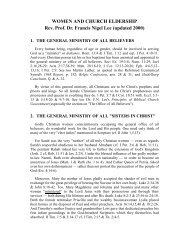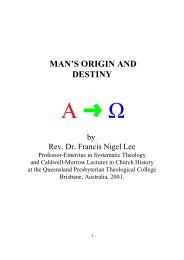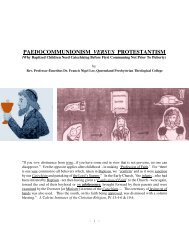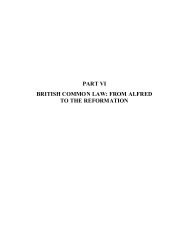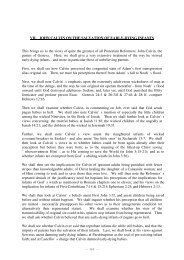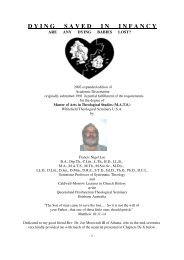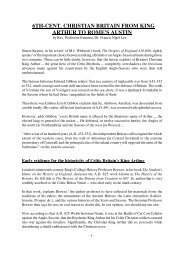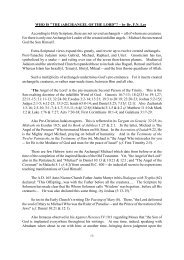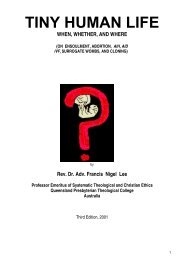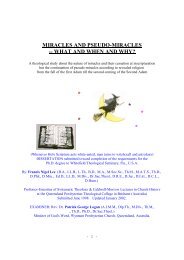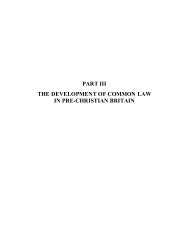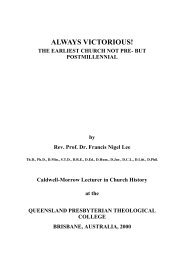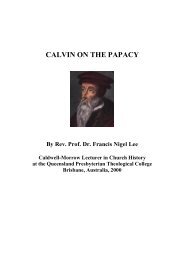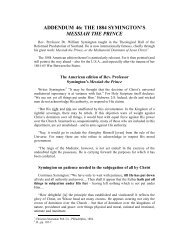philosophy from the religious a priori -- we are in fact making theology subject not to the objectivenorm <strong>of</strong> Scripture but to a subjective religious experience <strong>of</strong> Dooyeweerd's over which we have nocontrol.I think it is true to say that on this particular point Van Til has "seen the light" since 1940. Todayhe is very critical <strong>of</strong> what this subjectivistic point <strong>of</strong> departure in Dooyeweerd's epistemology hasled to. On this particular point, Potgieter today stands vindicated over against Dooyeweerd (andeven against the Van Til <strong>of</strong> 1940). For Van Til has distantiated himself, especially over the lasttwenty years, very sharply from Dooyeweerd on this point. Indeed, Van Til has come over more tothe position <strong>of</strong> Potgieter (and Stoker).Now Potgieter, amongst other things, is Chairman <strong>of</strong> the Christian Mission to the Jews Society <strong>of</strong>South Africa. In that capacity, he wrote a very interesting little book called Christ and Israel -- oneschatology. He says in this book: "In agreement with the principle laid down in Romans 11 verse11, the conspicuous coming in <strong>of</strong> the fullness <strong>of</strong> the Gentiles (compare Romans 11:12-15) willrouse Israel to jealously. <strong>The</strong> reciprocity <strong>of</strong> the stimulating action <strong>of</strong> the fullness <strong>of</strong> the Gentiles andthat <strong>of</strong> Israel, is evident. On the one hand, the acceptance by presumably many Gentiles -- leadingto their fullness -- arouses jealousy in Israel. With the result that they turn to the Messiah. And onthe other hand, the fullness <strong>of</strong> Israel means blessings untold for the Gentiles -- and culminates inlife from the dead for them."Yet I believe that perhaps the greatest living thinker in South Africa, a man now approaching hisninetieth birthday, is the great Hendrik Stoker. Pr<strong>of</strong>. Dr. Stoker has had a long innings as one <strong>of</strong> theworld's foremost philosophers. He started <strong>of</strong>f at the University <strong>of</strong> Potchefstroom in the 1920s,teaching fifty hours a week. During the war years (WW II), Stoker strenuously protested SouthAfrica's involvement. He favoured strict neutrality. As a result, General Smuts, then the PrimeMinister <strong>of</strong> South Africa, jailed Stoker and put him in a concentration camp at a place calledK<strong>of</strong>fiefontein.In that concentration camp there were numbers <strong>of</strong> other "hard-nosed" Calvinists who had alsoexpressed the desire for South Africa to remain neutral. <strong>The</strong>y included a young lawyer called JohnVorster -- who later became Prime Minister <strong>of</strong> South Africa. Later, at the end <strong>of</strong> the 1960's, asPrime Minister, he passed a law requiring all public education in South Africa from that timeonwards to be clearly Christian in the teaching <strong>of</strong> ever subject. Clearly, Vorster was Stoker's mostinfluential "graduate" from the makeshift "University <strong>of</strong> K<strong>of</strong>fiefontein." For Stoker, in theconcentration camp, rounded up these young Calvinists and started what he likes to call the"University <strong>of</strong> K<strong>of</strong>fiefontein" -- in the concentration camp! He gave them their assignments, andtaught them for a number <strong>of</strong> years. <strong>The</strong>n he issued pieces <strong>of</strong> paper that he had drawn up -- beinghonorary degrees, enabling them to boast that they had sat at his feet.Now Hendrik Stoker <strong>of</strong> Potchefstroom is certainly a Christian philosopher every bit the equal <strong>of</strong>Vollenhoven and Dooyeweerd. <strong>The</strong> interesting thing is that both Dooyeweerd and Vollenhovenconsider Stoker to be their equal . Van Til has said recently -- just two months ago, when visitingme in my own home as my guest -- that Stoker is, in his opinion, the world's leading thoroughlyChristian philosopher.Stoker as a young man went to Germany and wrote a doctoral dissertation there under the greatMax Scheler -- on the subject <strong>of</strong> Conscience ("Das Gewissen"). Although Stoker usually writesagainst a wealthy background <strong>of</strong> psychological experiences, he does tend to stress the cosmologicaland phenomenological aspects <strong>of</strong> philosophy and <strong>of</strong> reality rather more than he does theepistemological aspects (in the way the Amsterdam school does).
Now you will not find in any <strong>of</strong> Stoker's many writings a systematic presentation <strong>of</strong> philosophy in aset <strong>of</strong> volumes (such as in Dooyeweerd's New Critique <strong>of</strong> <strong>The</strong>oretical Thought). Stoker's thoughtrather consists <strong>of</strong> scores and scores <strong>of</strong> monographs -- nearly all <strong>of</strong> them written in Afrikaans, andmost still untranslated. <strong>The</strong>y cover a variety <strong>of</strong> subjects, the most important <strong>of</strong> which are perhapshis works on ontology.Here we are thinking especially <strong>of</strong> his masterpiece <strong>The</strong> Philosophy <strong>of</strong> the Idea <strong>of</strong> creation -- andalso <strong>of</strong> his work against evolution and on Calvinism and the Doctrine <strong>of</strong> the Law-Spheres. He hasalso given a rather critical evaluation <strong>of</strong> the "newer" philosophy at the Free University <strong>of</strong>Amsterdam (the views <strong>of</strong> Vollenhoven and Dooyeweerd). Also his brochure Something About aCalvinistic Philosophy is well worth studying.Moving out <strong>of</strong> the area <strong>of</strong> ontology into the area <strong>of</strong> epistemology, Stoker has written a whole host<strong>of</strong> works. I think his masterpiece in this field is his work <strong>The</strong> Necessity <strong>of</strong> Christian Scholarship.<strong>The</strong>re he, in great detail, gives suggestions for a formal methodology to be used in the pursuit <strong>of</strong> all<strong>of</strong> the various sciences at a Christian university. It is a very valuable work, and we desperately needit translated into English. (By the way, the Philosophy Department <strong>of</strong> Dordt College here in theUnited States believes that this work should enjoy priority to be translated into English, to be auseful tool for English-speaking Christian academicians throughout the world.)Other works Stoker has written on epistemology are <strong>The</strong> Problems <strong>of</strong> a General Gnosiology - and awork I myself have translated into English Something About Reasonableness and Rationalism. Ihave also translated his work, <strong>The</strong> Snail's Shell <strong>The</strong>ories <strong>of</strong> Consciousness. His Crisis in ModernPsychology is also an important work.Stoker has written many methodological works. His Principles <strong>of</strong> a Christian Doctrine <strong>of</strong> Scienceand his Christianity and Science I have available in translation (but not yet published). His workScriptural Faith and the Pursuit <strong>of</strong> Science I also translated (some twelve or thirteen years ago).Other works he wrote, were in the realm <strong>of</strong> causation theory -- Something About Causality. <strong>The</strong>nthere are his works on moral philosophy: <strong>The</strong> Basis <strong>of</strong> Morality -- and his <strong>The</strong>ological,Philosophical and Special Scientific Ethics.A very important work that we need to get translated into English, is Stoker's work that he wroteduring World War II -- perhaps from the concentration camp. It is entitled: <strong>The</strong> Battle <strong>of</strong> theOrders. <strong>The</strong>re, he contrasts Nazism, Communism, Socialism, Liberal Democracy and Calvinism --saying that the Calvinistic position on statecraft, in rejecting the others, is the only viable position.Just recently, in the last decade, some <strong>of</strong> his major writings have been collected in two volumes inthe anthology Oorsprong en Rigting (alias Origin and Direction).Now to Stoker, the idea <strong>of</strong> creation is far more encompassing than is the Amsterdam school'scosmonomic idea. Hence Stoker's so-called creationistic philosophy, or the philosophy <strong>of</strong> the idea<strong>of</strong> creation. Within the unity <strong>of</strong> God's creation, says Stoker, there are a variety <strong>of</strong> ontic differences<strong>of</strong> modalities, degrees, qualities, values and being. <strong>The</strong>re are not just different law-spheres, asDooyeweerd holds. Each <strong>of</strong> Stoker's different ontic realities not only possesses sovereignty in itsown sphere (as also in Dooyeweerd) -- but also possesses universality in its own sphere.In other words, you cannot say that each thing in the universe is sovereign in its own sphere - cut<strong>of</strong>f from everything else. Each thing in the universe, in its own way, also reflects the wholeuniverse within itself.You can now see why Van Til thinks so highly <strong>of</strong> Stoker as a philosopher. Because in Stoker's
- Page 1 and 2:
THE CHRISTIAN AFRIKANERSA Brief His
- Page 3 and 4:
God richly bless the following lect
- Page 5 and 6:
There have always been, and always
- Page 7 and 8:
But the only one they both appeal t
- Page 9 and 10:
Now Zuidema was a very great Dutch
- Page 11 and 12:
Dutch churches at the Synod of Dord
- Page 13 and 14:
station -- to help the Dutch ships
- Page 15 and 16:
It is a country dedicated to freedo
- Page 17 and 18:
1760 -- there was more and more dis
- Page 19 and 20:
with the Dutch. Many moved farther
- Page 21 and 22:
said: "The British have placed our
- Page 23 and 24:
financed by White money. It is buil
- Page 25 and 26: Famous Boer Generals, left to right
- Page 27 and 28: Three: Unannihilated: the Resurrect
- Page 29 and 30: (who had arrived in the country onl
- Page 31 and 32: of success.I may add that White Sou
- Page 33 and 34: General Beyers felt that those text
- Page 35 and 36: Balfour Declaration. The gist of it
- Page 37 and 38: Africa; treks on into the land both
- Page 39 and 40: Four: The Eschatology of Victory in
- Page 41 and 42: ide -- to use the instrumentality o
- Page 43 and 44: Christian National Calvinist Public
- Page 45 and 46: through constitutional process it h
- Page 47 and 48: I guess the best way to describe Sm
- Page 49 and 50: He was followed after his assassina
- Page 51 and 52: So the Scots came. I am going to sp
- Page 53 and 54: the Reformed Church in South Africa
- Page 55 and 56: ook on Hebrews. But his greatest wr
- Page 57 and 58: At that point, Du Plessis enquired
- Page 59 and 60: Yet quite apart from this high view
- Page 61 and 62: One last point. There is a tremendo
- Page 63 and 64: African Republic in 1902, the Cape
- Page 65 and 66: One of the most important Calvinist
- Page 67 and 68: Pellissier, who wrote on music and
- Page 69 and 70: perspective -- even while he minist
- Page 71 and 72: ever encountered by the Whites in S
- Page 73 and 74: Now the United States does not need
- Page 75: majority of the White citizens are
- Page 79 and 80: Finally, Stoker argues that the so-
- Page 81 and 82: This then brings Stoker to another
- Page 83 and 84: This Brummer just referred to, is a
- Page 85 and 86: Man was to rejoice in this nature (
- Page 87 and 88: enhanced. For, in the present, man
- Page 89 and 90: he declared, riddled with the ungod
- Page 91 and 92: Van der Waal is a very brilliant So
- Page 93 and 94: World War II when he was hiding fro
- Page 95 and 96: The Professor of Philosophy -- or I
- Page 97 and 98: glory.There are also Christian psyc
- Page 99 and 100: Then there are Christian criminolog
- Page 101 and 102: Massachusetts at Gordon- Conwell fo
- Page 103 and 104: well known -- is being pioneered in
- Page 105 and 106: people in South Africa. The South A
- Page 107 and 108: nature and of human culture (Prover
- Page 109 and 110: The parousia of Jesus Christ will i
- Page 111 and 112: more and more christianised. Later
- Page 113: END



